Pour le mérite is a Allemand film of genre War with Paul Hartmann
Pour le mérite (1938)
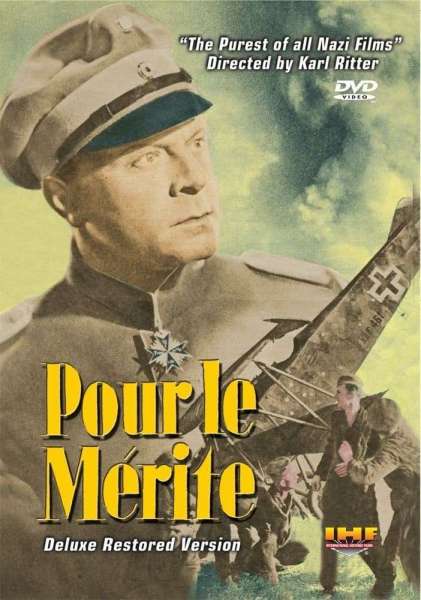
If you like this film, let us know!
- Infos
- Casting
- Technical infos
- Photos
- Videos
- Film quotes
- Characters
- Music
- Awards
Pour le mérite est film allemand réalisé par Karl Ritter, sorti en 1938.
Il s'agit d'un film de propagande nazie. Il diffuse l'idée de la Dolchstoßlegende, qui explique la défaite de la Première Guerre mondiale par une trahison à l'intérieur de l'Allemagne. Il décrit également les anciens soldats comme les pionniers du national-socialisme en Allemagne et glorifie le réarmement illégal de la Wehrmacht.
Synopsis
Le film est divisé en épisodes autour de quatre officiers de l'armée de l'air Fabian, Prank, Moebius et Gerdes, parfois individuellement, parfois ensemble.Actors

Paul Hartmann
(Rittmeister Prank)
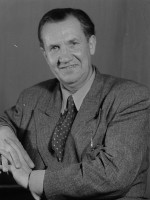
Fritz Kampers
(Moebius)

Herbert A.E. Böhme
(Oberleutnant Gerdes)

Albert Hehn
(Lt. Fabian)
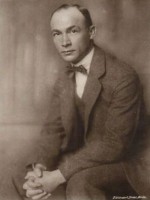
Paul Otto
Comments
Leave comment :
Suggestions of similar film to Pour le mérite
There are 100 films with the same actors, 4209 with the same cinematographic genres, 7854 films with the same themes (including 1230 films with the same 2 themes than Pour le mérite), to have finally 70 suggestions of similar films.If you liked Pour le mérite, you will probably like those similar films :

Above All Else in the World (1941)
, 1h25Origin German
Genres Drama
Themes Politique, Political films
Actors Paul Hartmann, Hannes Stelzer, Fritz Kampers, Carl Raddatz, Oskar Sima, Berta Drews
Rating65%





Following the outbreak of war, Germans abroad face persecution from the British and French authorities.
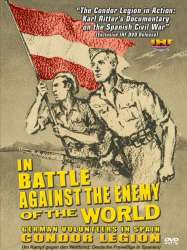 , 1h34
, 1h34Origin German
Genres War, Documentary
Themes Politique, Documentary films about war, Documentary films about historical events, Political films
Actors Paul Hartmann
Rating67%





Le film commence par la description des abominations bolcheviques. Les communistes sont confrontés aux francistes patriotes. On présente le rôle héroïque des volontaires allemands dans la guerre civile espagnole. Le film s'achève avec le retour des volontaires allemands dans leur pays d'origine, l'accueil des rapatriés par le Generalfeldmarschall Hermann Göring et les obsèques nationales à Berlin, au cours de laquelle les membres de la légion Condor reçoivent la croix d'Espagne.

The Crew of the Dora (1945)
, 1h31Origin German
Genres Drama, War
Themes Politique, Transport films, Aviation films, Political films
Actors Hannes Stelzer, Josef Dahmen, Clemens Hasse, Georg Thomalla, Ernst von Klipstein, Otz Tollen
Rating69%





Dans un triangle amoureux, deux des personnages oublient leur rivalité par la participation à la bataille.

Stukas (1941)
, 1h41Origin German
Genres Drama, War
Themes Politique, Transport films, Aviation films, Documentary films about war, Documentary films about historical events, Political films, Documentary films about World War II
Actors Carl Raddatz, Hannes Stelzer, Ernst von Klipstein, Albert Hehn, Herbert Wilk, O. E. Hasse
Rating52%





Les personnages principaux du film sont des pilotes de deux escadrons de bombardiers en piqué allemands ou Stukas. Le film n'a pas une intrigue stricte, la continuité narrative est brisée entre la vie dans la caserne et le combat aérien. Plusieurs aviateurs meurent et sont honorés par leurs camarades. Cette mort se produit "hors écran" et n'est reproduite que oralement.
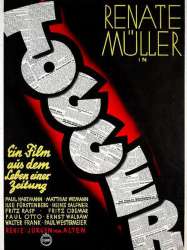
Togger (1937)
, 1h39Directed by Jürgen von Alten
Origin German
Genres Drama
Themes Films about writers, Films about journalists, Politique, Political films
Actors Paul Hartmann, Renate Müller, Heinz Salfner, Paul Otto, Mathias Wieman, Fritz Odemar
Rating54%





Pendant la République de Weimar, le Konzern international Reuler mène une politique d'acquisition agressive en Allemagne. L'industrie domestique est de plus en plus entre les mains de sinistres géants économiques, personne ne semble s'opposer à cette menace de la "domination étrangère". Une seule personne est prêt à mener la lutte : Togger, le rédacteur en chef du journal Der Neue Tag (Le Jour nouveau). Il a à ses côtés une personne influente que l'on connaît seulement sous le nom de "Lux". Reuler cherche à savoir sa véritable identité, en vain. Peter Geis, le confrère de Siebenstädter Boten n'y arriva pas non plus. Lors d'un accident de voiture, Togger fait la connaissance de Hanna Breitenbach. Elle est la fille du chef de Der Neue Tag, le professeur Breitenbach, et aussi Lux.
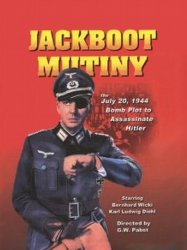
It Happened on July 20th (1955)
, 1h15Directed by Georg Wilhelm Pabst
Origin German
Genres Drama, War, Thriller, Historical
Themes Hitler, Political films
Actors Bernhard Wicki, Karl Ludwig Diehl, Erik Frey, Albert Hehn, Kurt Meisel, Ernst Fritz Fürbringer
Rating65%





Le 20 Juillet 1944, le colonel Baron Schenk von Stauffenberg prépare un attentat pour tuer Hitler, en utilisant une bombe dans son "Grand Quartier Général" dans l'est de la Prusse...
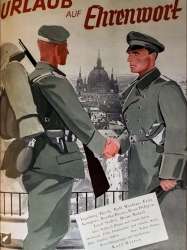
Furlough on Parole (1938)
, 1h27Genres Drama, War
Themes Political films
Actors Fritz Kampers, Carl Raddatz, Rolf Möbius, Berta Drews, Käthe Haack, Heinrich Schroth
Rating73%





Based on the autobiographical novella of the same title by Kilian Koll, (Walter Julius Bloem, Jr.), the film is set late in 1918, during the final stages of the First World War. A troop of German infantry are on their way from the Eastern to the Western Front and must change trains in Berlin. After marching through the centre of the city from one station to another, they must wait several hours for their connecting train. The major in command gives strict orders that no one must go into this city full of "deserters, revolutionaries, and defeatists", even though most of the men are from Berlin, but in response to the pleading of Colonel Hartmann (Fritz Kampers), who had saved his life in the trenches, young Lieutenant Prätorius (Rolf Moebius) grants passes on the men's solemn promise to return in time: "I have your word of hono[u]r that you will return and fulfill your duty in this critical hour of the fatherland. The unit is counting on you—and so is Germany." The film follows several of the men, in particular four of different ages and from different milieux. Infantryman Ullrich Hagen (Wilhelm König) is a composer; he visits his music teacher, who will shortly be performing one of his works and begs him to be true to his talent rather than throwing his life away in a futile cause. Colonel Hartmann, who is middle-aged, surprises his young wife, Anna, who has replaced him at his work driving a tram; she begs him to stay with her and their four children rather than returning to a war which is already lost. The third, a young man, after discovering his only relative has died, meets a girl and falls in love for the first time. The fourth, Infantryman Emil Sasse (René Deltgen) is a "leftist intellectual" who was cursing the notion of 'heroic death' and announcing his intention to desert in the opening scenes of the film; he finds his girlfriend Fritzi (Margot Erbst) printing anti-war leaflets. All four, however, resist the temptation to desert. Hagen responds that his works can speak for themselves; the young man considers his companions closer to him than his new love; Sasse finds he no longer likes revolutionaries: "We soldiers are dying for our country while you drink, hold meetings, and make love. ... I have nothing in common with you any more." He fights his way out of the meeting and arrives with a black eye and bruises. Hartmann loses track of time, but his family all pile into a friend's lorry and race the train to the next station; the lieutenant spots the speeding vehicle and all the men are back as they promised.

A German Robinson Crusoe (1940)
, 1h21Directed by Arnold Fanck
Genres Drama, War
Themes Seafaring films, Transport films, Political films
Actors Herbert A.E. Böhme, Marieluise Claudius, Claus Clausen, Oskar Marion, Ludwig Schmid-Wildy
Rating68%





During World War I, the German cruiser SMS Dresden is attacked by British ships off the coast of Chile. The crew manages to abandon ship before it sinks. They make their way to an isolated island where they are taken prisoner. After spending three years in custody, the sailors manage to escape and make their way back to Germany, intending to continue fighting for their Fatherland. When they arrive, however, they encounter a different Germany from the one they left behind—one where they are ridiculed and attacked by mutineers.
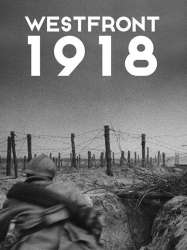
Westfront 1918 (1930)
, 1h33Directed by Georg Wilhelm Pabst
Origin German
Genres Drama, War, Romance
Themes Political films
Actors Fritz Kampers, Gustav Diessl, Claus Clausen, Gustav Püttjer, Jackie Monnier, Vladimir Nikolayevich Sokoloff
Rating72%





France 1918. In the last months of World War I, four infantrymen—Bayer, a young man known as 'the student' (Der Student), Karl and the lieutenant—spend a few rest-days behind the Front. Here, the student falls in love with the French peasant girl Yvette. Back at the Front, the four suffer again the everyday hardships of war, dirt trenches and danger of death. Bayer, Karl and the lieutenant become trapped when part of the trench collapses in, and the student digs them out. Later they are mistakenly fired upon by their own artillery due to a misjudgement of distance, and again they are saved by the student, who as a messenger risked his life to relay instructions to the soldiers setting the firing range of the artillery.

In Darkness (2011)
, 2h24Directed by Agnieszka Holland
Origin Pologne
Genres Drama, War
Themes Politique, Films about religion, Political films, Films about Jews and Judaism
Actors Robert Więckiewicz, Benno Fürmann, Maria Schrader, Agnieszka Grochowska, Weronika Rosati, Kinga Preis
Rating72%





In Darkness is a dramatization of a factual rescue of Jewish refugees during World War II in German-occupied Polish city Lwów (Lemberg in German, L'viv in Ukrainian). For over a year, a Polish Catholic sewer maintenance worker and burglar, Leopold Socha – along with his friend and coworker Szczepek Wróblewski – hid and cared for a group of hunted Polish Jews who had escaped the massacres and deportations during the liquidation of the Lwów Ghetto, at first helping them in exchange for daily payment, but then continuing to do so long after the Jews' money had run out and aiding them had become ever more dangerous.
 Connection
Connection